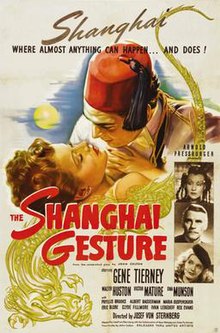Plot
Gigolo "Doctor" Omar (Victor Mature) bribes the Shanghai police not to jail the broke American showgirl Dixie Pomeroy (Phyllis Brooks); he invites her to seek a job at the casino owned by Dragon-lady "Mother" Gin Sling (Ona Munson), his boss.
In the casino, Omar attracts the attention of a beautiful, privileged young woman (Gene Tierney), fresh from a European finishing school. She is out for some excitement. When asked, she gives her name as "Poppy" Smith.
Meanwhile, Gin Sling is informed that she must move her establishment to the much less desirable Chinese sector. She is given five or six weeks, until Chinese New Year, to comply. Gin Sling is confident that she can thwart this threat to her livelihood, and orders her minions to find out everything they can about the man behind it, Englishman Sir Guy Charteris (Walter Huston), a wealthy entrepreneur who has purchased a large area of Shanghai that contains her gambling parlor. Dixie proves to be an unexpected source of information; Charteris had taken her out to dinner a number of times, before dumping her to avoid her meeting his newly arrived daughter, Poppy, whose real name is Victoria Charteris. From Dixie's description, Gin Sling realizes Charteris is someone from her past.
Meanwhile, Poppy falls in love with Omar and becomes addicted to gambling and alcohol. Though the spoiled woman is openly contemptuous of the casino owner, Gin Sling allows her credit to cover her ever-growing losses.
Gin Sling invites Charteris and other important dignitaries to a Chinese New Year dinner party. Charteris at first declines, but then curiosity gets the better of him. At the dinner, she exposes his disgraceful past. Charteris, then calling himself Victor Dawson, had married her. One day, he abandoned her, taking her inheritance, leaving her destitute and alone. Thinking her baby had died and forced to do whatever she had to in order to survive, she wandered from place to place, until she reached Shanghai. There, Percival Howe had faith in her and backed her financially, allowing her to work her way up to her current position.
To cap her revenge, she has Victoria brought in. Victoria openly flaunts her attraction to Omar and ridicules her father. As Charteris takes his wayward daughter out, he tells Van Elst privately to come to his office the next morning to pick up a £20,000 check for Gin Sling and tell her "the funds she claims I took are, and always have been in an account in her name" in a north China bank.
Despite hearing this, Victoria defies him and goes back inside where the other guests have left. When he tries to retrieve her, he is confronted by Gin Sling. He then reveals that their baby had been found alive and put in a hospital where Charteris found her and brought her up far from China. Victoria is Gin Sling's own daughter.
Gin Sling then tries to talk to Victoria alone, revealing that she is her mother, but when the young woman continues insulting her, Gin Sling shoots her dead. The Dragon Lady then remarks to Howe that this is something she cannot bribe her way out of. The muscular coolie, standing outside with Charteris, delivers the bitingly ironic last line "you likee Chinese New Year?" as Charteris realizes what has happened.
Production
There were several attempts to turn the play into a film in the 1930s, one of them by Cecil B. DeMille, and another in the early 1930s by Edward Small at United Artists. [4] By 1940, it was estimated there had been 32 previous attempts to film the play. Among the changes made to appease the censor was the replacement of the Japanese character of Prince Oshima with Dr Omar to avoid depicting miscegenation. [5] Filming began on August 11, 1941. [6]
In the listing of actors in the opening credits is an ending title card honoring the extras reading, "And a large cast of 'HOLLYWOOD EXTRAS' who without expecting credit or mention stand ready day and night to do their best—and who at their best are more than good enough to deserve mention." Keye Luke painted the mural displayed in the casino.
Victor Mature, in a 1941 interview with Duncan Underhill, reported the following exchange with Josef von Sternberg directing him on the set of Shanghai Gesture:
Von Sternberg [yelling]: “You are not a floorwalker in Shanghai’s Macy’s. You are a sinister dope, understand, in a nice way. You are an innocent bush-league Mephisto.”
Mature: “What is a bush-league Mephisto? I don’t get it.”
Von Sternberg [barking]: “I am.” [7]
Von Sternberg, in his 1965 autobiography declared that the film “launched Gene Tierney and Victor Mature as stellar attractions. It also contained the superlative talents of Walter Huston, Albert Bassermann and Ona Munson.” [8]
Reception
Variety described it as "a rather dull and hazy drama of the Orient." [9] "Victor Mature, as the matter-of-fact Arab despoiler of Tierney’s honor, provides a standout performance. Huston’s abilities are lost in the jumble, while Munson cannot penetrate the mask-like makeup arranged for her characterization." [9]
Oleg Cassini later said "Both Gene and I were hopeful," about the movie. "A prestigious director, a good cast... perhaps this would lead to other opportunities. But the film was an overwrought turkey destroyed by the critics, who gave Gene her first bad reviews. My costumes were not even mentioned in passing." [10]
In 2005, film critic Dennis Schwartz gave the film a positive review, writing, "Josef von Sternberg's ( The Scarlet Empress / The Blue Angel / The Devil is a Woman ) last great Hollywood film is based on a 1925 play by John Colton that required over 30 revisions ordered by the Breen Office censors before it was deemed acceptable. In one unreleased censored version, attributed to writer Jules Furthman, the blemished noirish character named Mother Gin Sling is instead named Mother Goddamn and runs a brothel instead of a casino. What remains from all the cuts is the surreal baroque setting--a gesture to the descent of mankind into the bowels of the earth--a casino designed like Dante's Inferno. Despite the forced changes, this is still a delirious masterpiece of decadence and sexual depravity that surrounds itself with Eastern motifs that are meant to mystify rather than enlighten." [11]
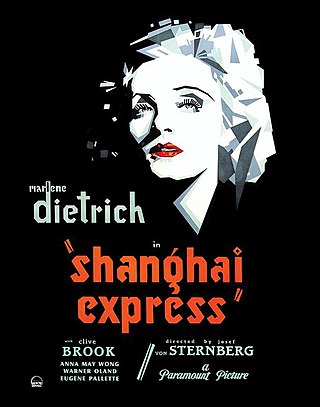
Shanghai Express is a 1932 American pre-Code film about a group of train passengers held hostage by a warlord during the Chinese Civil War. It was directed by Josef von Sternberg and stars Marlene Dietrich, Clive Brook, Anna May Wong and Warner Oland. The screenplay was written by Jules Furthman based on a 1931 short story by Harry Hervey. Shanghai Express was the fourth of seven films that Sternberg and Dietrich created together.

The Docks of New York is a 1928 American silent drama film directed by Josef von Sternberg and starring George Bancroft, Betty Compson, and Olga Baclanova. The movie was adapted by Jules Furthman from the John Monk Saunders story The Dock Walloper.
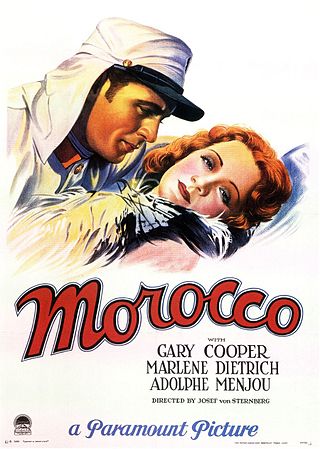
Morocco is a 1930 American pre-Code romantic drama film directed by Josef von Sternberg and starring Gary Cooper, Marlene Dietrich, and Adolphe Menjou. Based on the 1927 novel Amy Jolly by Benno Vigny and adapted by Jules Furthman, the film is about a cabaret singer and a Legionnaire who fall in love during the Rif War, and whose relationship is complicated by his womanizing and the appearance of a rich man who is also in love with her. The film is famous for a scene in which Dietrich performs a song dressed in a man's tailcoat and kisses another woman, both of which were considered scandalous for the period.

Prizzi's Honor is a 1985 American black comedy crime film directed by John Huston, starring Jack Nicholson and Kathleen Turner as two highly skilled mob assassins who, after falling in love, are hired to kill each other. The screenplay co-written by Richard Condon is based on his 1982 novel of the same name. The film's supporting cast includes Anjelica Huston, Robert Loggia, John Randolph, CCH Pounder, Lawrence Tierney, and William Hickey. Stanley Tucci appears in a minor role in his film debut. It was the last of John Huston's films to be released during his lifetime.
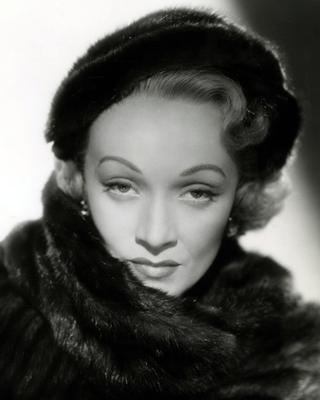
Marie Magdalene "Marlene" Dietrich was a German and American actress and singer whose career spanned from the 1910s to the 1980s.

Gene Eliza Tierney was an American film and stage actress. Acclaimed for her great beauty, she became established as a leading lady. She was best known for her portrayal of the title character in the film Laura (1944), and was nominated for an Academy Award for Best Actress for her performance as Ellen Berent Harland in Leave Her to Heaven (1945).

Victor John Mature was an American stage, film, and television actor who was a leading man in Hollywood during the 1940s and 1950s. His best known film roles include One Million B.C. (1940), My Darling Clementine (1946), Kiss of Death (1947), Samson and Delilah (1949), and The Robe (1953). He also appeared in many musicals opposite such stars as Rita Hayworth and Betty Grable.
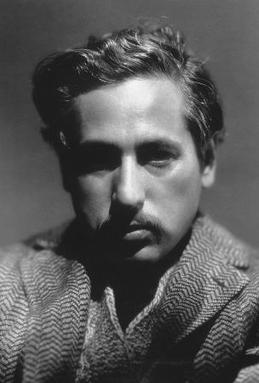
Josef von Sternberg was an Austrian-born filmmaker whose career successfully spanned the transition from the silent to the sound era, during which he worked with most of the major Hollywood studios. He is best known for his film collaboration with actress Marlene Dietrich in the 1930s, including the highly regarded Paramount/UFA production The Blue Angel (1930).

Ona Munson was an American film and stage actress. She starred in nine Broadway productions and 20 feature films in her career, which spanned over 30 years.
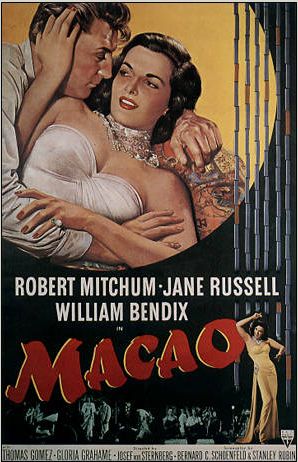
Macao is a 1952 American adventure film noir directed by Josef von Sternberg and Nicholas Ray and starring Robert Mitchum, Jane Russell, William Bendix, and Gloria Grahame. Shot in black-and-white, it was distributed by RKO Pictures.

The Scarlet Empress is a 1934 American historical drama film starring Marlene Dietrich and John Lodge about the life of Catherine the Great. It was directed and produced by Josef von Sternberg from a screenplay by Eleanor McGeary, loosely based on the diary of Catherine arranged by Manuel Komroff.

The Devil Is a Woman is a 1935 American romance film directed and photographed by Josef von Sternberg, adapted from the 1898 novel La Femme et le pantin by Pierre Louÿs. The film was based on a screenplay by John Dos Passos, and stars Marlene Dietrich, Lionel Atwill, Cesar Romero, Edward Everett Horton, and Alison Skipworth. The movie is the last of the six Sternberg-Dietrich collaborations for Paramount Pictures.

Karl Gustav Vollmöller was a German philologist, archaeologist, poet, playwright, screenwriter, and aircraft designer. He is most famous for the elaborate religious spectacle-pantomime The Miracle and the screenplay for the celebrated 1930 film The Blue Angel, which made a star of Marlene Dietrich.
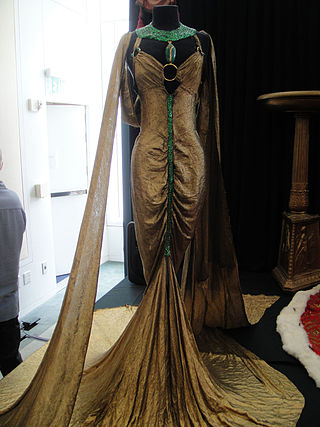
Travis Banton was an American costume designer. He is perhaps best known for his long collaboration with actress Marlene Dietrich and director Josef von Sternberg. He is generally considered one of the most important Hollywood costume designers of the golden age.
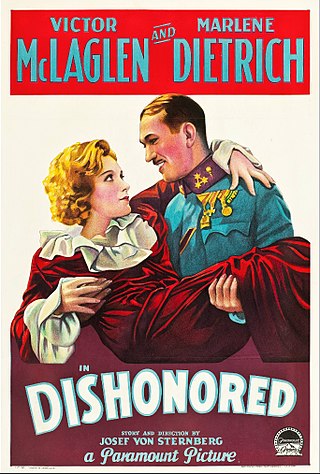
Dishonored is a 1931 American pre-Code romantic spy film directed and edited by Josef von Sternberg, who also co-wrote the film with Daniel N. Rubin. It was produced and distributed by Paramount Pictures. The film stars Marlene Dietrich, Victor McLaglen, Gustav von Seyffertitz, and Warner Oland, and follows a female spy (Dietrich) for Austria-Hungary during World War I. Costume design was provided by Travis Banton, in one of his several collaborations with Dietrich.
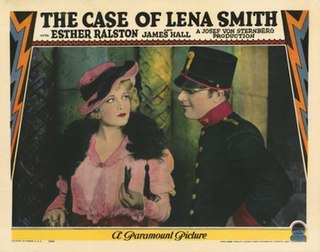
The Case of Lena Smith is a 1929 American silent drama film directed by Josef von Sternberg, starring Esther Ralston and James Hall, and released by Paramount Pictures.
Dragon Lady is usually a stereotype of certain East Asian and occasionally South Asian and/or Southeast Asian women as strong, deceitful, domineering, mysterious, and often sexually alluring. Inspired by the characters played by actress Anna May Wong, the term comes from the female villain in the comic strip Terry and the Pirates. It has since been applied to powerful women from certain regions of Asia, as well as a number of Asian and Asian American film actresses. The stereotype has generated a large quantity of sociological literature. "Dragon Lady" is sometimes applied to persons who lived before the term became part of American slang in the 1930s. "Dragon Lady" is one of two main stereotypes used to describe women, the other being "Lotus Blossoms". Lotus Blossoms tend to be the opposite of the Dragon Lady stereotype, having their character being hyper-sexualized and submissive. Dragon Lady is also used to refer to any powerful but prickly woman, usually in a derogatory fashion.

Mary Duncan was an American stage and film actress. She is best known for her performances in F.W. Murnau's City Girl (1930) and Morning Glory (1933).

A Date with the Falcon is the second in a series of 16 films about the suave detective nicknamed The Falcon. The 1942 sequel features many of the same characters as the first film, The Gay Falcon (1941).

Corrado Racca was an Italian actor and voice actor.
